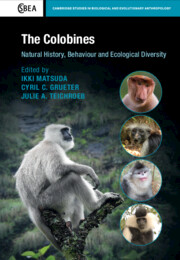Book contents
- The Colobines
- Cambridge Studies in Biological and Evolutionary Anthropology
- The Colobines
- Copyright page
- Contents
- Contributors
- Foreword
- Acknowledgements
- 1 General Introduction
- 2 Taxonomic Classification of Colobine Monkeys
- 3 The Colobine Fossil Record
- 4 Molecular Phylogeny and Phylogeography of Colobines
- 5 Relationships between the Diet and Dentition of Asian Leaf Monkeys
- 6 Morphology and Physiology of Colobine Digestive Tracts
- 7 Colobine Gut Microbiota
- 8 Colobine Nutritional Ecology
- 9 Red Colobus Natural History
- 10 Natural History of Black-and-White Colobus Monkeys
- 11 Behaviour and Ecology of Olive Colobus
- 12 Ecology and Behaviour of Odd-Nosed Colobines
- 13 Ecology of Semnopithecus
- 14 Ecology of Sympatric and Allopatric Presbytis and Trachypithecus Langurs in Sundaland
- 15 Ecology of Trachypithecus spp. in the Indo-Burmese Region
- 16 Socioecology of Asian Colobines
- 17 Socioecology of African Colobines
- 18 Causes and Consequences of the Formation of Multilevel Societies in Colobines
- 19 Colobine Population Ecology
- 20 State of Asian Colobines and Their Conservation Needs
- 21 Conservation of Africa’s Colobine Monkeys (Cercopithecidae, Colobinae) with Taxonomic and Biogeographic Considerations
- 22 Directions for Future Research
- References
- Index
1 - General Introduction
Published online by Cambridge University Press: 08 February 2022
- The Colobines
- Cambridge Studies in Biological and Evolutionary Anthropology
- The Colobines
- Copyright page
- Contents
- Contributors
- Foreword
- Acknowledgements
- 1 General Introduction
- 2 Taxonomic Classification of Colobine Monkeys
- 3 The Colobine Fossil Record
- 4 Molecular Phylogeny and Phylogeography of Colobines
- 5 Relationships between the Diet and Dentition of Asian Leaf Monkeys
- 6 Morphology and Physiology of Colobine Digestive Tracts
- 7 Colobine Gut Microbiota
- 8 Colobine Nutritional Ecology
- 9 Red Colobus Natural History
- 10 Natural History of Black-and-White Colobus Monkeys
- 11 Behaviour and Ecology of Olive Colobus
- 12 Ecology and Behaviour of Odd-Nosed Colobines
- 13 Ecology of Semnopithecus
- 14 Ecology of Sympatric and Allopatric Presbytis and Trachypithecus Langurs in Sundaland
- 15 Ecology of Trachypithecus spp. in the Indo-Burmese Region
- 16 Socioecology of Asian Colobines
- 17 Socioecology of African Colobines
- 18 Causes and Consequences of the Formation of Multilevel Societies in Colobines
- 19 Colobine Population Ecology
- 20 State of Asian Colobines and Their Conservation Needs
- 21 Conservation of Africa’s Colobine Monkeys (Cercopithecidae, Colobinae) with Taxonomic and Biogeographic Considerations
- 22 Directions for Future Research
- References
- Index
Summary
Colobinae, which includes more than 70 species grouped into 10 genera distributed throughout Asia and Africa, show a wide range of ecological and social traits. The colobines are generally forest-living and arboreal, which can make research on this often-elusive group difficult. Despite these challenges, our understanding of colobine behaviour, ecology and morphology has increased a great deal over the decades since the first research review on this primate subfamily was published by Davies and Oates (1994). While new research has demonstrated the incredible variation of colobine natural history, and the adaptability of this group, some colobine populations have declined and are now critically endangered. The Colobines brings together experts from around the world in an innovative volume that summarizes the current knowledge on colobine populations.
- Type
- Chapter
- Information
- The ColobinesNatural History, Behaviour and Ecological Diversity, pp. 1 - 2Publisher: Cambridge University PressPrint publication year: 2022

